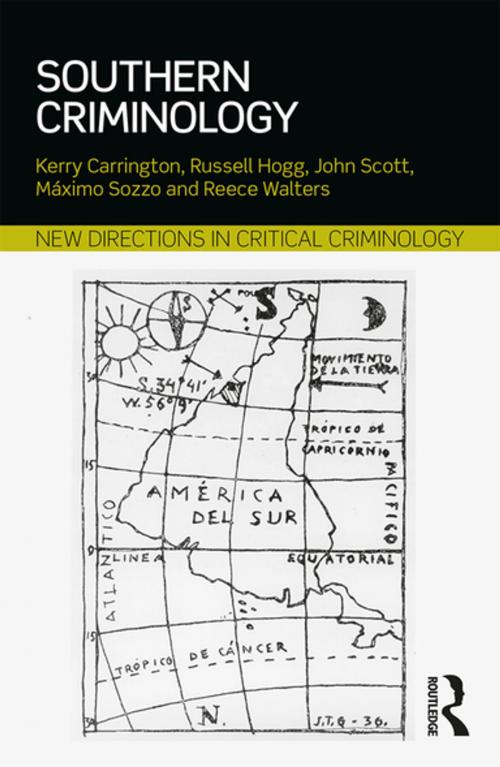Southern Criminology
Nonfiction, Social & Cultural Studies, Social Science, Crimes & Criminals, Criminology| Author: | Kerry Carrington, Russell Hogg, John Scott, Máximo Sozzo, Reece Walters | ISBN: | 9781351761482 |
| Publisher: | Taylor and Francis | Publication: | September 18, 2018 |
| Imprint: | Routledge | Language: | English |
| Author: | Kerry Carrington, Russell Hogg, John Scott, Máximo Sozzo, Reece Walters |
| ISBN: | 9781351761482 |
| Publisher: | Taylor and Francis |
| Publication: | September 18, 2018 |
| Imprint: | Routledge |
| Language: | English |
Criminology has focused mainly on problems of crime and violence in the large population centres of the Global North to the exclusion of the global countryside, peripheries and antipodes. Southern criminology is an innovative new approach that seeks to correct this bias.
This book turns the origin stories of criminology, which simply assumed a global universality, on their head. It draws on a range of case studies to illustrate this point: tracing criminology’s long fascination with dangerous masculinities back to Lombroso’s theory of atavism, itself based on an orientalist interpretation of men of colour from the Global South; uncovering criminology’s colonial legacy, perhaps best exemplified by the over-representation of Indigenous peoples in settler societies drawn into the criminal justice system; analysing the ways in which the sociology of punishment literature has also been based on Northern theories, which assume that forms of penalty roll out from the Global North to the rest of the world; and making the case that the harmful effects of eco-crimes and global warming are impacting more significantly on the Global South. The book also explores how the coloniality of gender shapes patterns of violence in the Global South.
Southern criminology is not a new sub-discipline within criminology, but rather a journey toward cognitive justice. It promotes a perspective that aims to invent methods and concepts that bridge global divides and enhance the democratisation of knowledge, more befitting of global criminology in the twenty-first century.
Criminology has focused mainly on problems of crime and violence in the large population centres of the Global North to the exclusion of the global countryside, peripheries and antipodes. Southern criminology is an innovative new approach that seeks to correct this bias.
This book turns the origin stories of criminology, which simply assumed a global universality, on their head. It draws on a range of case studies to illustrate this point: tracing criminology’s long fascination with dangerous masculinities back to Lombroso’s theory of atavism, itself based on an orientalist interpretation of men of colour from the Global South; uncovering criminology’s colonial legacy, perhaps best exemplified by the over-representation of Indigenous peoples in settler societies drawn into the criminal justice system; analysing the ways in which the sociology of punishment literature has also been based on Northern theories, which assume that forms of penalty roll out from the Global North to the rest of the world; and making the case that the harmful effects of eco-crimes and global warming are impacting more significantly on the Global South. The book also explores how the coloniality of gender shapes patterns of violence in the Global South.
Southern criminology is not a new sub-discipline within criminology, but rather a journey toward cognitive justice. It promotes a perspective that aims to invent methods and concepts that bridge global divides and enhance the democratisation of knowledge, more befitting of global criminology in the twenty-first century.















